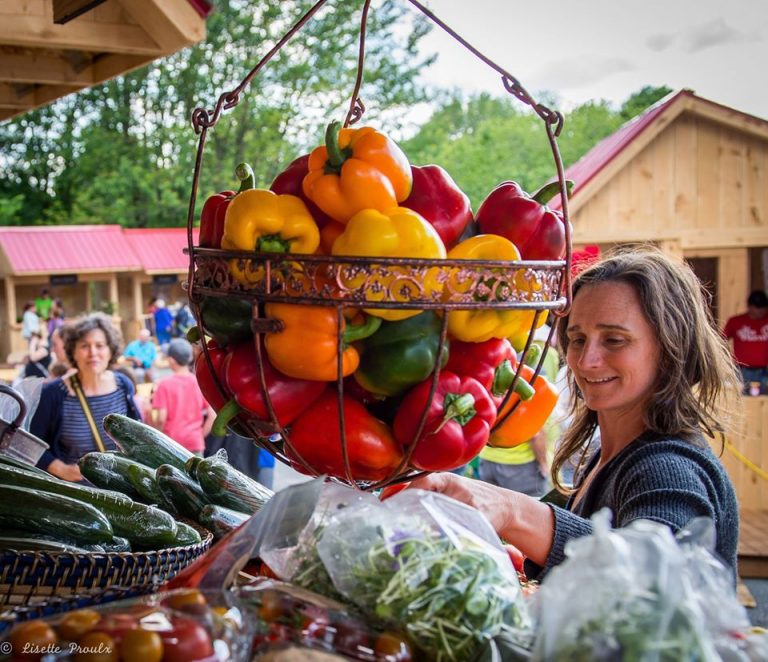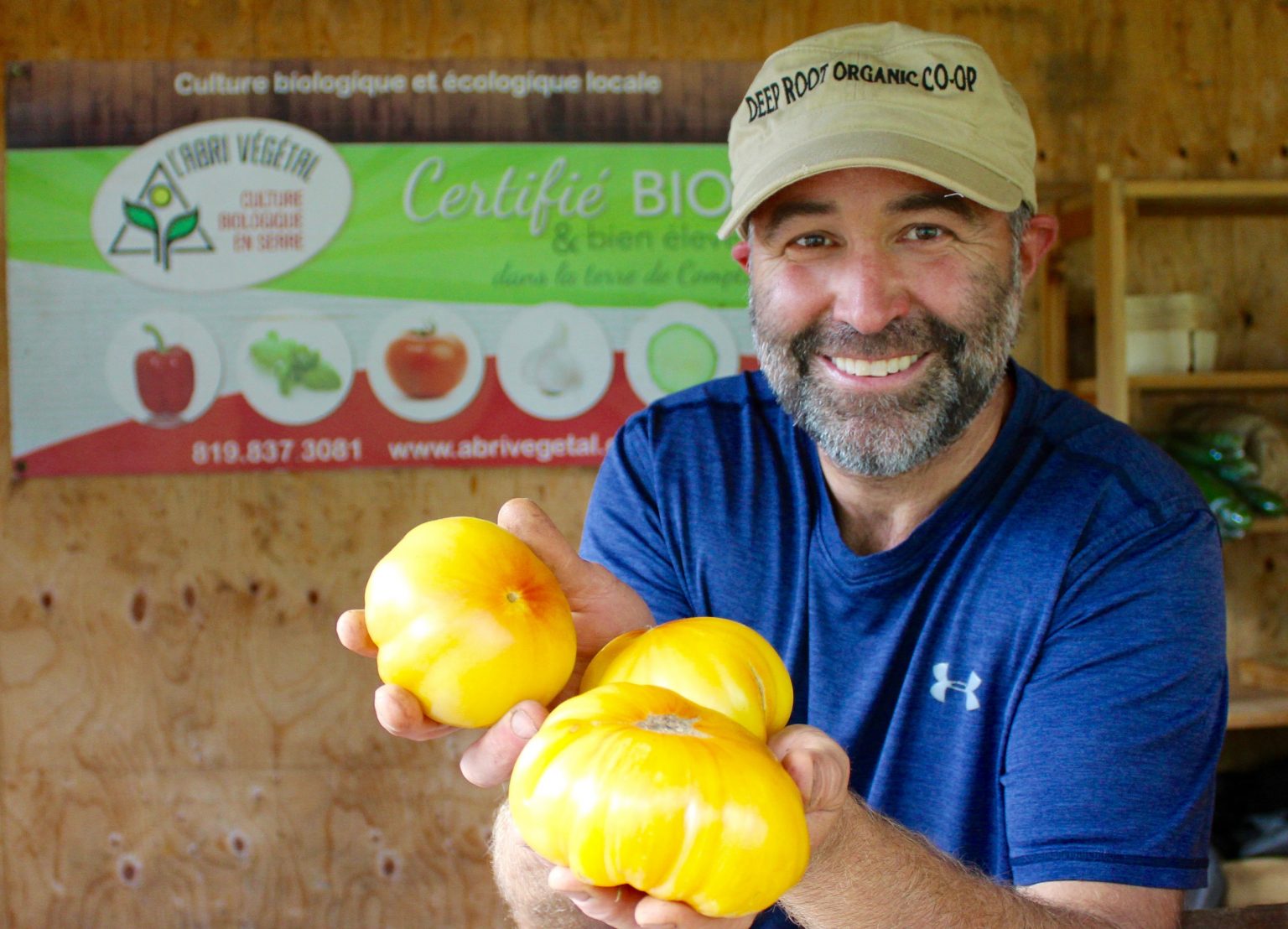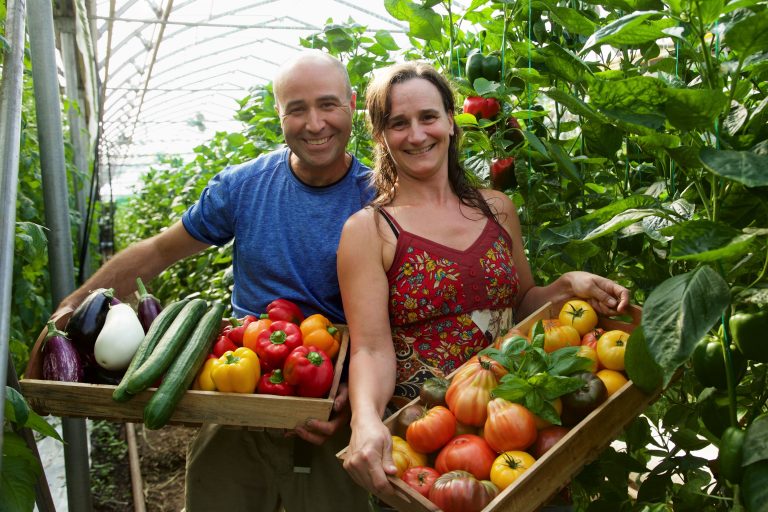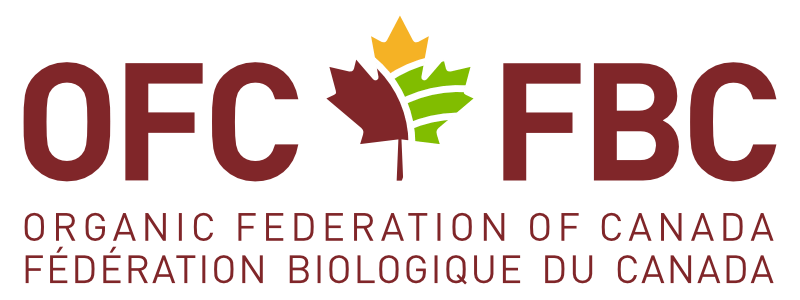
By Joannie D’Amours,
PhD Student, Dalhousie University
Organic greenhouse operators want to optimize use of light, energy and natural resources for four-season vegetable production. The goal is to reduce the ecological footprint, enhance food security, and improve farm sustainability and profitability. Frédéric Jobin-Lawler and Annie Lévesque, owners of Abri Végétal, support this approach by participating in research led by Martine Dorais, a professor at Laval University, who is comparing vertical organic agriculture to the intelligent use of greenhouses as part of Organic Science Cluster 3.
Abri végétal is a family farm in Compton, Québec’s Eastern Townships, which produces organic greenhouse vegetables (tomatoes, cucumbers, etc.), herbs and microgreens. Their products are sold locally and exported to the US. The owners aim to reduce their carbon footprint, while adapting to new market conditions (crop diversification, increase in the length of growing season) and support scientific research. Complementing the laboratory tests conducted at Laval University, Abri Végétal is a real-life test site for three aspects of the Organic Cluster research:
1) production of microgreens in growth chambers;
2) intra-canopy cultivation; and
3) effect of biostimulants.
The producers sow various crops (Swiss chard, pak choi, mustard, shiso, amaranth, etc.), which are harvested after 21 days and combined to create a microgreen mix. Before the Organic Science Cluster project, the quality of their product was highly dependent on the quality of the potting soil. They want to optimize their production methods to ensure the quality of their product, while adding flavour and nutritional qualities not achievable in hydroponic systems. They are evaluating the impact of light, fertilizer and inoculant types on the microgreens. During the first part of the project in growth chambers, light emitting diode (LED) lights were tested with different light spectrum and different photoperiods:
– long days and short nights (20 hours (h) sunlight, 4h darkness);
– short days and very short nights (5h sun and 1h darkness alternating over 24 hours);
– control: natural sunlight supplemented by high pressure sodium (HPS) lights.
These comparisons aimed to determine the efficiency and cost-effectiveness of the different systems. LEDs reduced energy consumption and heat emission. For microgreens, LED use in growth chambers is ideal because the temperature produced by HPS fixtures is unsustainable for the
plants. Frédéric Jobin-Lawler looks forward to optimizing their methods of producing microgreens in growth chambers. “I will have a lot of knowledge about the effects of photoperiods and the impact of the light spectrum. I will be able to apply this knowledge afterwards”.

In the second part of the research, Abri
Végétal sought to optimize the 3000m2
of greenhouses by improving the yield per
square meter. Instead of the usual gap
between two crops, they overlapped crop
spacing of different crops. Growing two
crops is cost-effective because it increases the yield/m2.
They transplanted cucumber seedlings
at the base of tomato plants that were
nearing the end of their life. Timing of
transplanting was chosen to give the young
crop adequate light. The growers reduced
the foliage of the old crop in favour of the young crop, and placed lights inside the tomato canopy to give the seedlings sufficient light. Frédéric Jobin-Lawler has gained expertise by helping with the experimental setup. He now wants to add lights throughout the greenhouses. Since diseases are favoured by continuous cultivation, different inoculum treatments (bio-suppressants) will be tested during the third part of the research activity. The bio-suppressants could limit the establishment of certain pathogens, such as Pythium. The treatments will be applied by inoculating potting soil with a new treatment or by using leachate from their soil (to tap into the microflora already present). Through this research, Abri Végétal seeks, above all, to support the science; the producers know that sometimes the results do not meet expectations. “It’s as important to know what works as it is to know what doesn’t.”

At the end of a research cycle, researchers summarize and disseminate the results of the entire project to the various partners. Jobin-Lawler appreciates these presentations: “It allows us to have information quickly on what has happened elsewhere and it directs us towards new avenues of testing to be done at home.” The greenhouse growers at Abri Végétal have a clear vision of the future of organic soil-based agriculture: “We have always believed in the principle of organic certification, that a plant should grow in the soil”. They want to offer consumers organic products that stand out for their terroir flavour, in addition to being products without synthetic pesticides.
By collaborating with Organic Cluster research, they hope to demonstrate that
the soil is the best source of protection against many plant diseases. The preliminary results of the next part of the project on bio-suppressors look promising!
The Organic Science Cluster 3 is led by the Organic Federation of Canada in collaboration with the Organic Agriculture Centre of Canada at Dalhousie University, and is supported by the AgriScience Program under Agriculture and Agri-Food Canada’s Canadian Agricultural Partnership (an investment by federal, provincial and territorial governments) and over 70 partners from the agricultural community.
This magazine may be cited as: Geldart, E.. Graves, M.E., Boudreau, N., Wallace, J., and Hammermeister, A.M. (Editors). 2022. Organic Science Canada. Volume 4. Organic Federation of Canada, Montreal, QC and Dalhousie University, Truro, NS. 40 pp. www.dal.ca/oacc/oscIII


